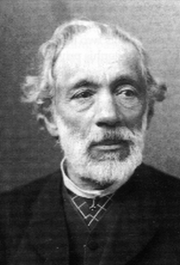
Eduard Franck
Encyclopedia

Felix Mendelssohn
Jakob Ludwig Felix Mendelssohn Barthóldy , use the form 'Mendelssohn' and not 'Mendelssohn Bartholdy'. The Grove Dictionary of Music and Musicians gives ' Felix Mendelssohn' as the entry, with 'Mendelssohn' used in the body text...
, and Wagner. His family’s financial position allowed Franck to study with Mendelssohn as a private student in Düsseldorf and later in Leipzig. As a talented pianist, he embarked upon a dual career as a concert artist and teacher for more than four decades during the course of which he held many positions.
Although he was highly regarded as both a teacher and performer, he never achieved the public recognition of his better known contemporaries such as Mendelssohn, Schumann or Liszt. As fine a pianist as the first two and perhaps even a better teacher, the fact that he failed to publish very many of his compositions until toward the end of his life, in part, explains why he was not better known. Said to be a perfectionist, he continually delayed releasing his works until they were polished to his demanding standards. Schumann, among others, thought quite highly of the few works he did publish during the first part of his life.
His chamber music is generally considered amongst his finest compositions. Of the works with opus numbers, there are 3 string quartets, 2 string quintets for 2 violins, 2 violas and cello, 2 string sextets, 3 piano trios, a piano quintet, 2 sonatas for cello & piano, and 4 sonatas for violin and piano. In addition to these, there are several other works without opus, including a piano sextet, 2 piano trios, a piano quintet, a sonata for violin & piano and an occasional piece for cello & piano.
Wilhelm Altmann, probably the most important chamber music critic of the 20th century, in writing of Franck’s chamber music, comments:
“This excellent composer does not deserve the neglect with which he has been treated. He had a mastery of form and a lively imagination which is clearly reflected in the fine and attractive ideas one finds in his works.”
Of Franck’s Second Sextet, Altmann states: “This sextet belongs in the concert hall. It demonstrates that its composer was master of musical form and in possession of a gift which allows him to produce strong and noble melodies.”
He was the father of Richard Franck
Richard Franck
Richard Franck was a German pianist, composer and teacher. He was born in Cologne and was the son of the German composer, pianist and teacher Eduard Franck...
.
Within the next years, all available works of Eduard Franck will be published in critical Editions by Pfefferkorn Music Publishers, Leipzig.
List of chamber music works with opus number
- Op.6: Sonata for Violoncello & Piano in D Major
- Op.11: Piano Trio No.1 in e minor
- Op.15: String Quintet in e minor (2 Vln, 2 Vla & Vc)
- Op.19: No.1: Sonata for Violin & Piano in c minor
- Op.22: Piano Trio No.2 in E Flat Major
- Op.23: No.2: Sonata for Violin & Piano in A Major
- Op.41: String Sextet No.1 in E Flat Major, 2011 critical Urtext-Edition by Pfefferkorn Music Publishers (Leipzig)
- Op.42: Sonata for Violoncello & Piano in F Major
- Op.45: Piano Quintet in D Major
- Op.49: String Quartet No.1 in f minor (also known as Op.40)
- Op.50: String Sextet No.2 in D Major, 2011 critical Urtext-Edition by Pfefferkorn Music Publishers (Leipzig)
- Op.51: String Quintet No.2 in C Major (2 Vln, 2 Vla & Vc)
- Op.53: Piano Trio No.3 in E Flat Major
- Op.54: String Quartet No.2 in E Flat Major
- Op.55: String Quartet No.3 in c minor
- Op.58: Piano Trio No.4 in D Major
- Op.60: Sonata for Violin & Piano in E Major
Orchestral works (partial list)
- Op.12: Concert-overture in E (1848)
- Op.13: Piano Concerto in D minor (1850)
- Op.30: Violin Concerto in E minor (1855)
- Op.47: Symphony in A (1860?)
- Op.52: Symphony in B (1856)
- Op.57: Violin Concerto in D (1860)
- Without opus?: Piano Concerto No.2 in C? (1879) (manuscript)
External links
- Website of Pfefferkorn Music Publishers, Leipzig
- Eduard Franck String Sextet Nos.1 & 2, String Quartet Nos. 2 & 3 and Piano Quintet Op.45 Soundbites & short biography.
- http://www.klassika.info/Komponisten/Franck/index.html
- http://www.audite.de
- Early works for Piano, scores and recordings: on a modern grandpiano and on a Berndt grandpiano from 1848

